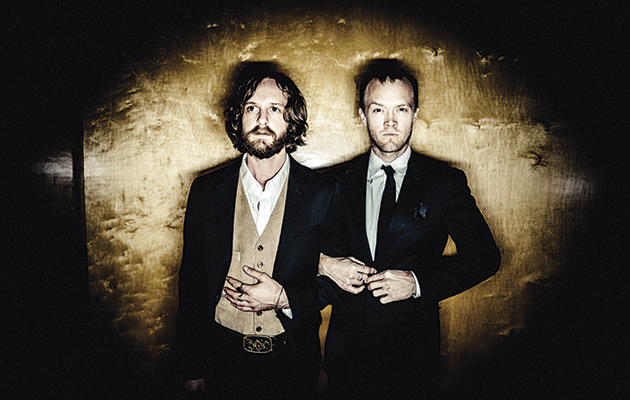There’s an underlying air of menace that squats at the bottom of Two Gallants fifth album like yeast in a bottle of beer, fermenting future discontent. The California guitar-drum duo have always had a dark view of the world and We Are Undone opens in high gothic fashion with a reverb-laden intro that sounds like a Hammer House organ.
It’s a suitably dramatic introduction to the world of Two Gallants, in which singer Adam Stephens castigates the perilous state of the world and the demise of his native San Francisco against a shifting sonic palate that makes light of the supposed limitations of a two-man band. Two Gallants can swagger and rage like the Black Keys, but they can also find moments of ambient bliss to complement songs of helplessness and regret.
After its B-movie intro, opening song “We Are Undone” is embellished by a distinctive, metal-ready guitar line, as Stephens introduces one of the album’s prevailing themes – the failure of art and creativity against the onslaught of commerce and capitalism. This is something Stephens revisits consistently, scratching the scab from different perspectives, never liking what he finds underneath After the catchy grunge of “Incidental”, the rollicking “Fools Like Us” picks up the thread. While Tyson Vogel builds a march, Stephens sings arrestingly about the limitations of his trade – “you search for authenticity until you become a fake, you think you’ll find salvation in a song” – and the tricks artists pull when “hunting muses”. “You force your heart to fall in love just to feel it break,” he roars, before concluding “fools like us just don’t belong”.
With a sense of impotence established, the pair take things down a notch with the strange “Invitation To A Funeral”, slow, simmering, sullen, with an ominous beat mirroring medieval lyrics of bitter resentment which end in wailing lament. It gives way to “Some Trouble”, wicked brooding blues albeit with box-ticking lyrics that would be trite if they didn’t fit so snug. Having reached midway and rarely straying from a blues rock template, there’s now a switch of style. “My Man Go” is probably the best song on the album, an undulating shanty on epic scale with an Eno-esque handling of dynamics and a desolate, heart-felt vocal: “In the ruins of my night, I can still pretend, close my eyes and see my life as it could have been.” Stephens is a powerful singer capable of lacerating heroics, but here he holds back, giving the song almost unbearable tension.
It feeds into “Katy Kruelly”, a folky, finger-picking intermission that’s strangely reminiscent of Ian Brown in its jaunty word play. Even this tender song is stoked by regret – “I think I loved you more than most, I tried to love you truly, but I couldn’t love you half as much as I did Katy Kruelly.” The mood of personal failure is maintained through “Heartbreakdown”, with Vogel effectively mimicking a malfunctioning machine, but with an overall impact that’s too slight to excite.
A bolder, broader sense of drama returns on the boiling hard rocker “Murder The Season/The Age Nocturne”, with Stephens providing a raucous, threatening vocal that warns of a near-distant future, an artificial age in which “their devices keep them real, frame their thoughts and print their meals, tame their hearts and paint their lawns, show pictures of a world that’s gone”. Again, Stephens is decrying the end of authentic experience, and our own complicity in allowing it to happen. The brilliant “There’s So Much I Don’t Know” brings it all into focus, as Stephens mourns his home town of San Francisco, a city he feels has sold out, “where all the strange has gone”. San Francisco represents everything Stephens stands against, and the pace is sad but stately, led by piano and punctuating by shimmering cymbals, with Stephens admitting his sense of bewilderment at a place that has been rendered unrecognisable, a world that has left him behind but which he still can’t quite let go.
Q&A
Adam Stephens
What are the advantages of being in a duo?
The ideas I have wouldn’t reach their potential without us being together, they don’t get anywhere until we sit down and start messing with it together. I’ve always seen being in a duo as a necessary obstacle and if there’s a consistency it comes from that limitation. It’s a bridge that we attempt to reach across with our respective instruments to meet in the middle.
Is there a sense of regret on this album?
It’s not personal regret, I see it more as a general regret for humanity. It’s not about somebody’s life falling apart because they made a bad choice, it’s all of humanity falling apart because of bad choices that have collectively been made. That creates a feeling of helplessness. That’s my response to a lot of what I feel, a sense of helplessness that can be stifling and frustrating.
What’s wrong with San Francisco?
We’re both native San Franciscans and we have to witness all these things happening that no native considers an improvement. Pretty much every change makes the city more uninviting and not very San Franciscan. It’s not an inviting place for anybody who wants to be weird and live a life based on self-expression. But I still do these futile searches for that last untouched corner of San Francisco that hasn’t been invaded by modernity and Google, looking for those things that don’t exist anymore.



